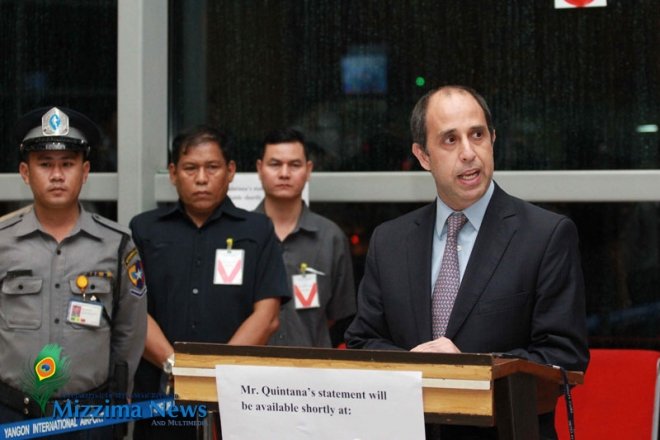The United Nations General Assembly will today begin discussing the report on the human rights situation in Myanmar submitted a month ago by UN special envoy, Tomás Ojea Quintana.
The 23-page report praises the release of political prisoners, but calls for an easing of restrictions on demonstrations and protests, a more equitable sharing of resources between the national and regional governments and greater efforts to ensure the ceasefires reached with armed ethnic groups are enforced.

Phil Robertson, deputy director of the Asia division at New York-based Human Rights Watch, described Mr. Ojea Quintana’s report as “extraordinarily fine”, saying it clearly identifies the challenges Myanmar faces in improving its human rights record.
Discussions about the report will be the basis for subsequent UN resolutions on Myanmar, Mr. Robertson said.
Mr. Ojea Quintana has praised the freeing of political prisoners. But he has also said that former prisoners can face restrictions on movement or difficulty obtaining passports and professional work licenses. His report welcomes the release of 951 prisoners in 11 amnesties that began in May 2011, after Thein Sein became president.
The report notes that the government still controls demonstrations, assemblies and other gatherings as well as the formation of groups and associations.
Mr. Ojea Quintana’s report includes a snapshot of the country’s development issues, including information from his visit to the country’s poorest state: Chin. It says that there is an unbalanced sharing of resources between the Union government and regional governments.
Civil wars persist in Kachin State, and the northern and Palaung areas of Shan State despite the signing of ceasefire agreements between the union government’s Peace Working Committee and armed ethnic groups.
Mr. Robertson criticized attacks on armed ethnic groups by government troops and said the government should allow international organizations to deliver humanitarian aid to those displaced by conflict as soon as possible.
The Human Rights Watch activist said he supported the reforms taking place in Myanmar but urged the government to take responsibility for human rights violations occurring now as well as those that occurred in the past.
Since Thein Sein became president in 2011, Mr. Ojea Quintana has visited Myanmar seven times, with the last visit occurring in August.



